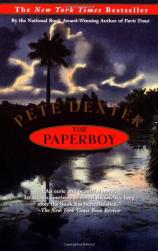Reading Group Guide
Discussion Questions
The Paperboy

1. The book begins with the death of Sheriff Call, about which the narrator says the message was "not the loss of Thurmond Call, but of something more fundamental that people had felt themselves losing all along." The story goes on to record many losses. Is there a character who does not lose something but gains something during the course of this story? If so, is it because the character is marked by a lack of expectations?
2. The narrator of the story remarks that "a newspaper story, like anything else, is more attractive from a distance, when it comes to you, than it is when you get close and agonize over the details." What are Ward, Yardley, and Charlotte initially attracted to in the case of Hillary Van Wetter? What does each character hope to gain from the case, and how is each disappointed as he or she becomes familiar with the story's details?
3. Water is a powerful image throughout the book. Jack swims as a means of healing, Ward dies in the ocean, and Jack distinctly recalls that he has never seen his father wet. Discuss how each character is defined by his relationship to water. How is it significant that the Van Wetter family lives in the swamplands? And what does the author intend by placing the James family in a county called Moat?
4. Discuss the similarities between Ward and Charlotte that drive them to connect with destructive people, Yardley and Hillary Van Wetter respectively. What do they have in common that would explain each one's self-destructive behavior? What about them explains why one life ended in murder and one in suicide?
5. Ward continually places himself in potentially violent situations, but, as Jack points out, "those were not the things that frightened my brother." What satisfaction does Ward gain from the threat of violence? In what situations is Ward shown to be truly frightened, and what causes his fear?
6. Two generations of reporters are portrayed in this story. Jack observes his father and his fellow editors and comments that "what moved them was not to know things, but to tell them." How is Ward's approach to journalism fundamentally different from his father's and what effect does this have on their relationship?
7. Throughout the book, W.W. is disturbed by his disintegrating family, but there is evidence that he is to blame for his isolation. What potentially fruitful relationships does he neglect?
8. Charlotte calls Hillary an intact man. What does she mean by this? Is there a point during her meetings with him when she realizes she is wrong? If so, why does she marry him?
9. Jack reflects that Charlotte was left with a situation which while of her own making, bore no resemblance to the one she had envisioned. Do you think this is true of W.W. Ward, and Jack? What do you think each one envisioned for himself, and how do you think he sees himself through the course of this story?
10. More than anything else, W.W. looks forward to the moment he can hand the newspaper over to his son Ward. How does the publication of Ward's story affect this plan?
11. What do you think was the deciding factor in Ward's ultimate demise: the rejection by his father, the beating he suffered and the exposure of his homosexuality, or the aftermath of the Hillary Van Wetter investigation?
12. It has been said of Pete Dexter that "what deepens and darkens his writing so that art is the precise word to describe it is a powerful understanding that character rules, that we live with our weaknesses and die of our strengths" (John Skow, Time). How is Ward's decline inextricably tied to his strengths as a person and a reporter? Discuss this observation as it applies to other characters in the book.
The Paperboy
- Publication Date: January 1, 1996
- Paperback: 336 pages
- Publisher: Delta
- ISBN-10: 0385315724
- ISBN-13: 9780385315722







